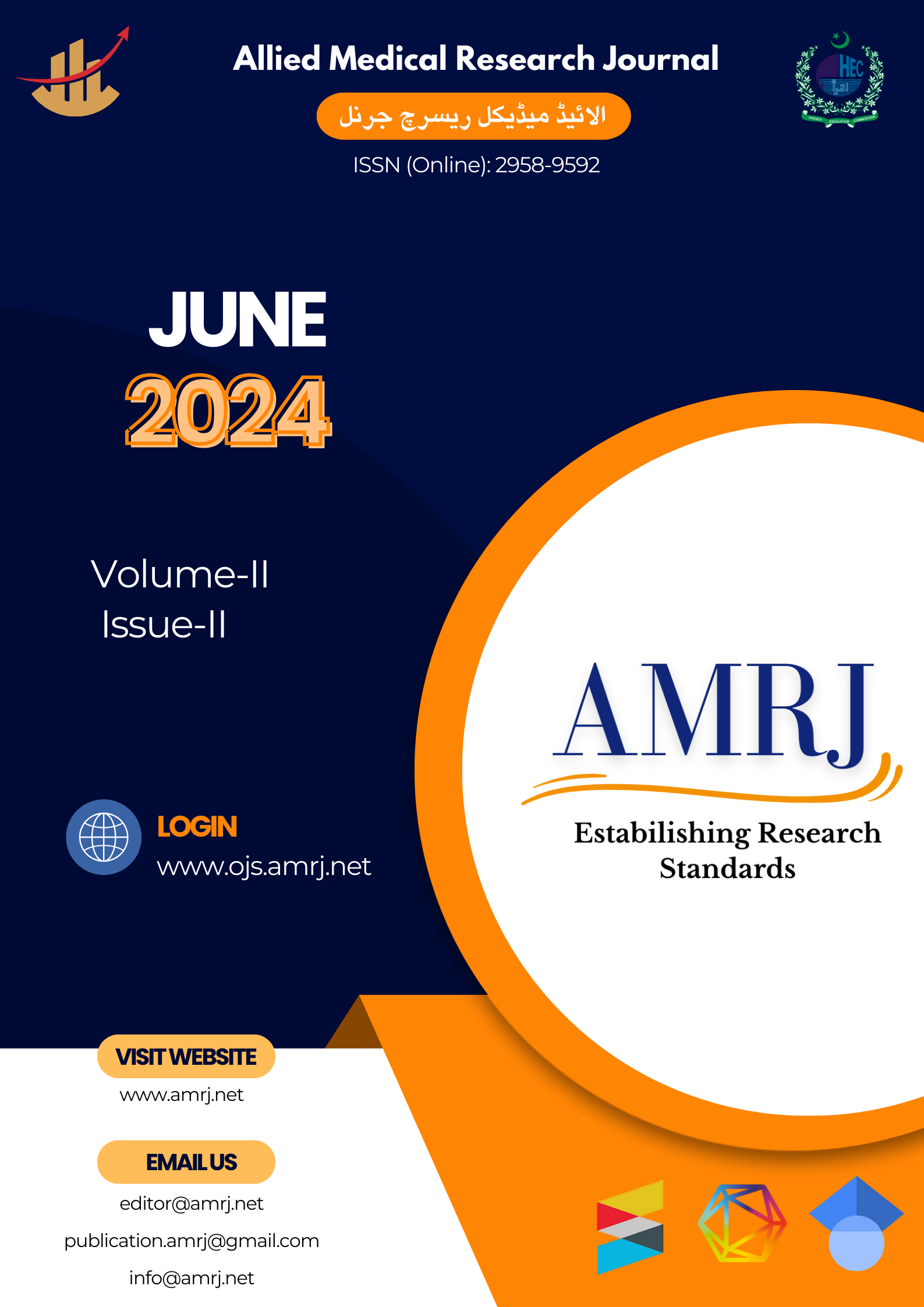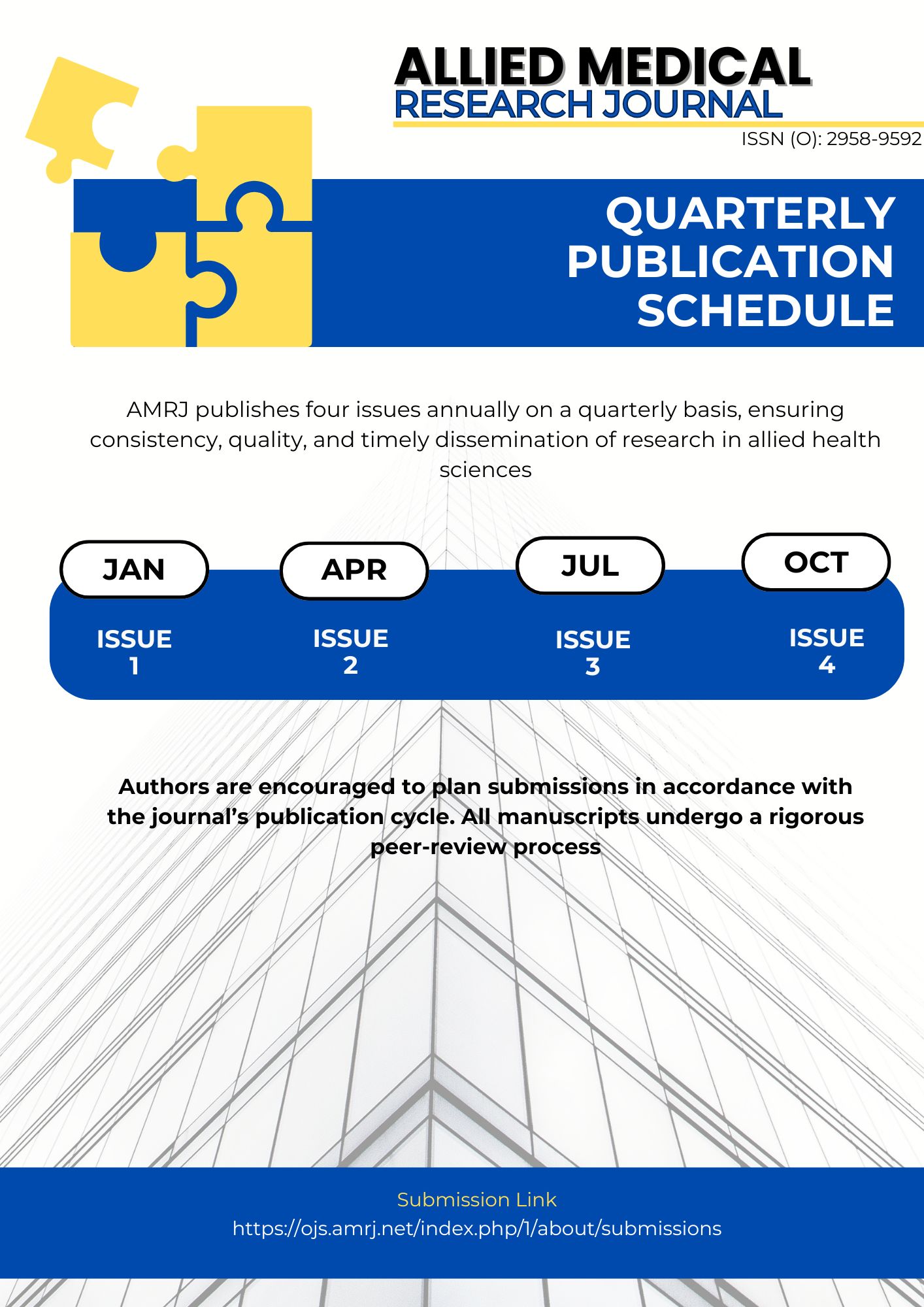Affordable Design and Implementation of a 4-Channel EEG Bio-signal Amplification System with Mobile App Visualization Interface
Affordable 4-Channel EEG Bio-signal Amplifier
Keywords:
Brain, Encephalogram, Health Technology, PrototypeAbstract
Background: Electroencephalogram (EEG) is a non-invasive, real-time visualization of the brain’s electrical activity to detect any abnormalities in the nervous system before the onset of critical conditions. Therefore, this project aimed to design a cost-effective, high-accuracy, and user-friendly EEG monitoring system to monitor brain activity.
Methodology: The functional prototype was developed at NED University, Pakistan. Initially, electrodes were selected for optimal signal acquisition. An instrumentation amplifier with high differential gain was employed at the preamplification stage due to the low amplitude of the acquired signals. 5th order Butterworth Band-pass filters were designed for the filtration of the signal. Subsequently, a driving circuit was designed to reject all the common-mode signals. Upon competition of the design for all the blocks, the circuit was transferred onto a Printed circuit board for further analysis and validation of results.
Results: The developed device was able to measure brain activity accurately. Real-time data was wirelessly transmitted through Bluetooth that can be visualized on cell phones. The device was significantly cost-effective compared to commercially available products.
Conclusion: The developed system offers a cost-effective solution for real-time EEG monitoring. The final prototype successfully detected, filtered and amplified EEG signals, acquired from the body. Utilizing Bluetooth technology, the processed signals were displayed on a mobile application, thereby providing an affordable solution for monitoring brain activity.
References
Belanger HG, Vanderploeg RD, Curtiss G, Warden DL. Recent neuroimaging techniques in mild traumatic brain injury. J Neuropsychiatry Clin Neurosci. 2007;19(1):5–20.
Siuly S, Li Y, Zhang Y. Electroencephalogram (EEG) and its background. In: EEG Signal Analysis and Classification. Cham: Springer International Publishing; 2016. p. 3–21. doi:10.1007/978-3-319-47653-7_1.
Sahin ME, Ucar Y, Temurtas F. An implementation of analog portable EEG signal extraction system. In: 2015 9th International Conference on Electrical and Electronics Engineering (ELECO). IEEE; 2015. p. 1126–31.
Tchiotsop D, Kanaa T, Fogue M, Njomo AFT, Zana KK. Low cost and low power ECG recorder suitable for low incomes populations. Int J Electron Commun Comput Eng. 2015;6:558.
Bosetti C, Ferrini L, Ferrari AR, Bartolini E, Calderoni S. Children with Autism Spectrum Disorder and abnormalities of clinical EEG: A qualitative review. J Clin Med. 2024;13(2):279.
Lenartowicz A, Loo SK. Use of EEG to diagnose ADHD. Curr Psychiatry Rep. 2014;16(11):498.
EEG Signal Processing for Alzheimer’s Disorders Using Discrete Wavelet Transform and Machine Learning Approaches [Internet]. Available from: https://ieeexplore.ieee.org/abstract/document/9857825
Ianof JN, Anghinah R. Traumatic brain injury: An EEG point of view. Dement Neuropsychol. 2017;11(1):3–5.
Nilawati S, et al. Unraveling emotional regulation through multimodal neuroimaging techniques. BrainBridge Neurosci Biomed Eng. 2024;1(1):1–26.
EEG-based functional connectivity analysis of brain abnormalities: A systematic review study. Inform Med Unlocked. 2024;47:101476.
Mullen TR, et al. Real-time neuroimaging and cognitive monitoring using wearable dry EEG. IEEE Trans Biomed Eng. 2015;62(11):2553–67.
Fatoorechi M, et al. A comparative study of electrical potential sensors and Ag/AgCl electrodes for characterising spontaneous and event related electroencephalagram signals. J Neurosci Methods. 2015;251:7–16.
Whitchurch AK, Abraham JK, Lonkar MA, Varadan VK. Design of a compact amplifier and signal conditioning module for wireless EEG monitoring. In: 2007 IEEE Region 5 Technical Conference. IEEE; 2007. p. 153–6.
Tallgren P, Vanhatalo S, Kaila K, Voipio J. Evaluation of commercially available electrodes and gels for recording of slow EEG potentials. Clin Neurophysiol. 2005;116(4):799–806.
Dilmaghani R, et al. Design and implementation of a wireless multi-channel EEG recording. In: 2010 7th International Symposium on Communication Systems, Networks & Digital Signal Processing (CSNDSP 2010). IEEE; 2010. p. 741–6.
An EEG analysis approach towards brain-to-brain synchronization | IEEE Conference Publication | IEEE Xplore [Internet]. Available from: https://ieeexplore.ieee.org/abstract/document/9411590
NeuroSpy: A low-cost portable IoT enabled EEG and ECG data processor | IEEE Conference Publication | IEEE Xplore [Internet]. Available from: https://ieeexplore.ieee.org/abstract/document/9357429
Kumar N. Design of Non Invasive Wireless EEG Recording System. 2015.
EEG Recording and Online Signal Processing on Android: A Multiapp Framework for Brain‐Computer Interfaces on Smartphone - Blum - 2017 - BioMed Research International - Wiley Online Library [Internet]. Available from: https://onlinelibrary.wiley.com/doi/full/10.1155/2017/3072870
Frontiers | The Acceptability, Feasibility, and Utility of Portable Electroencephalography to Study Resting-State Neurophysiology in Rural Communities [Internet]. Available from: https://www.frontiersin.org/articles/10.3389/fnhum.2022.802764/full
Liu C, et al. Complex brain network analysis and its applications to brain disorders: A survey. Complexity. 2017;2017:8362741.
Melinda M, Arnia F, Yafi A, Andryani NAC, Enriko IKA. Design and implementation of mobile application for CNN-based EEG identification of Autism Spectrum Disorder. Int J Adv Sci Eng Inf Technol. 2024;14(1):57.
NeuroPhone | Proceedings of the second ACM SIGCOMM workshop on Networking, systems, and applications on mobile handhelds [Internet]. Available from: https://dl.acm.org/doi/abs/10.1145/1851322.1851326
Mujib MD, Hasan MA, Qazi SA, Vuckovic A. Understanding the neurological mechanism involved in enhanced memory recall task following binaural beat: A pilot study. Exp Brain Res. 2021;239(9):2741–54.
Mujib MD, et al. Comparative neurological and behavioral assessment of central and peripheral stimulation technologies for induced pain and cognitive tasks. Biomedicines. 2024;12(7):1269.
Ather M, et al. Efficacy of audiovisual neurofeedback training for attention enhancement: A multimodal approach. NeuroReport. 2024;10:1097.
Rao AZ, et al. Sensor fusion and machine learning for seated movement detection with trunk orthosis. IEEE Access. 2024;12:41676–87.

Downloads
Published
Issue
Section
License
Copyright (c) 2024 Laiba Farooq, Muhammad Danish Mujib, Ahmad Zahid Rao, Fazila Farooq, Abdul Wadood, Sijil Zehra, Muhammad Farooq Usmani, Muhammad Abul Hasan

This work is licensed under a Creative Commons Attribution-NonCommercial 4.0 International License.








